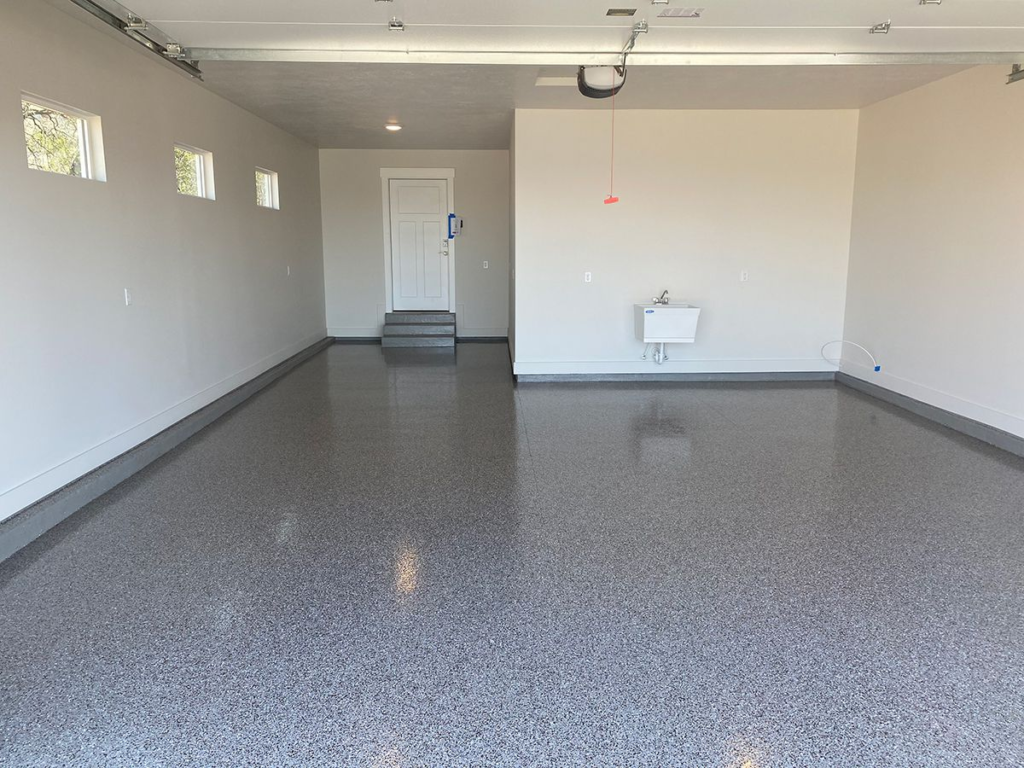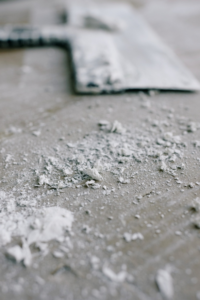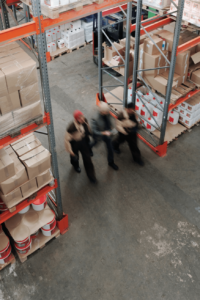Not sure whether steel-coated epoxy flooring will suit your garage floor? Or are you skeptical whether your concrete floor is better left as it is instead of being coated with epoxy flooring?
At Steel Coated Floors, we believe it’s our duty to make customers comfortable with their choice of flooring before they take the next step and get it installed. While we are available for all kinds of consultancy, we have compiled a list of epoxy floor coating FAQs for your convenience.
1. What are steel-coated epoxy floors?
Comprised of resin and hardener, our epoxy floor coating is a compound that results in strong and seamless flooring when applied in layers on concrete flooring by our professionals. The result is a waterproof, heat-resistant floor that can take even the heaviest impacts and remain scratch-free!
Epoxy is a synthetic chemical group found in resins. A chemical reaction occurs when it comes in contact with hardening agents, causing the epoxy to bind itself strongly to the hardener. The resulting compound is steel-coated epoxy, which we then layer on your floors through a complex procedure.
2. How long is the procedure?
While the epoxy flooring procedure is complex, it only takes our professionals three to four days to finish the process. If you’re planning to get your floors renovated, take a look at a summary of the process here:
1) Grinding
- Your furniture is removed, and the floor is prepared
- A layer of the floor is ground using a diamond grinder, and it is cleaned
2) Etching
- Muriatic acid solution is sprayed on the floor to dissolve any cement layer
- Scrubbing causes the concrete pores to open
- The acid is neutralized with a basic solution
- Final rinsing
3) Filling
- Any damage, cracks, or joints are filled with epoxy fillers
4) Basecoat
- The epoxy resin is mixed with color and hardener for the basecoat
- The basecoat is applied to the floor
5) Topcoat
- After the basecoat, texture flakes can be layered depending on your choice
- Finally, a clear top coat of epoxy flooringis applied
3. How do epoxy floors compare to traditional concrete floors?
Concrete has been around forever, which makes it a tough competitor for epoxy floors, the origins of which can be traced to the 1930s. Nevertheless, a deeper understanding of the chemical properties of concrete can help you compare it to modern steel epoxy floor coating.
Concrete comprises strongly-bonded calcium silica hydrates, which have gaps in between them. This property causes concrete to be porous, unlike epoxy resin. The pores can trap water from humidity in the atmosphere and result in cracks and damage to your floor, requiring frequent repairs.
Epoxy floors are non-porous and waterproof. In terms of maintenance and strength, they are better than concrete floors because of their durability and longevity.
4. What use are steel-coated floors best suited to?
Steel-coated epoxy floors are versatile; they are ideal for various uses, including industrial epoxy floor coating, warehouse floors, Hangar flooring, flooring for shops, garage floor coating, basement flooring, and even kitchen and living room flooring!
This is because epoxy flooring offers qualities that benefit you in different places—its durability and impact resistance makes it ideal for areas with heavy machinery and traffic, while its reflective factor is excellent for retail showrooms. Epoxy flooring is also customizable, making it perfect for upgrading your living room aesthetic.
5. Are epoxy floors safe?
Completely! we ensure that our epoxy flooring is layered with non-slip additives and texture flakes to remove any chances of the floor being slippery. Our floors are also waterproof and heat resistant, making them excellent for areas with fire hazards.
Industrial buildings and garages usually have chemical spillage risks. Epoxy flooring is completely resistant to chemical corrosion, meaning no damage to your floor at all. We also ensure our customers that our epoxy floors are free of any toxic volatile organic compounds (VOCs), keeping your health and the environment a priority.
While you might sense some chemical odors during installation, you won’t notice anything different after the process because we keep the area ventilated during our work.
6. Do epoxy floors have drawbacks?
Even after so many benefits, a poorly done epoxy floor job can show numerous problems, including damage caused by moisture trapped between the concrete and epoxy layers or your floor not lasting long.
In our experience of more than 6500 jobs, these problems are caused by DIY kits with a low solids percentage in the base coat of the epoxy flooring. While low percentages are much easier to apply, neither their finish nor robustness can match high-quality epoxy resin coats. Therefore, it is always advised to go for expert epoxy flooring contractors if you want to reduce the chances of any problems with your steel-coated epoxy floors.
We hope these epoxy floor coating FAQs helped you figure your preferred flooring choice out. We are a company of professionals operating in Draper, Las Vegas, Prescott, and other cities. Contact us to get a quote or consult regarding steel-coated epoxy floors.





